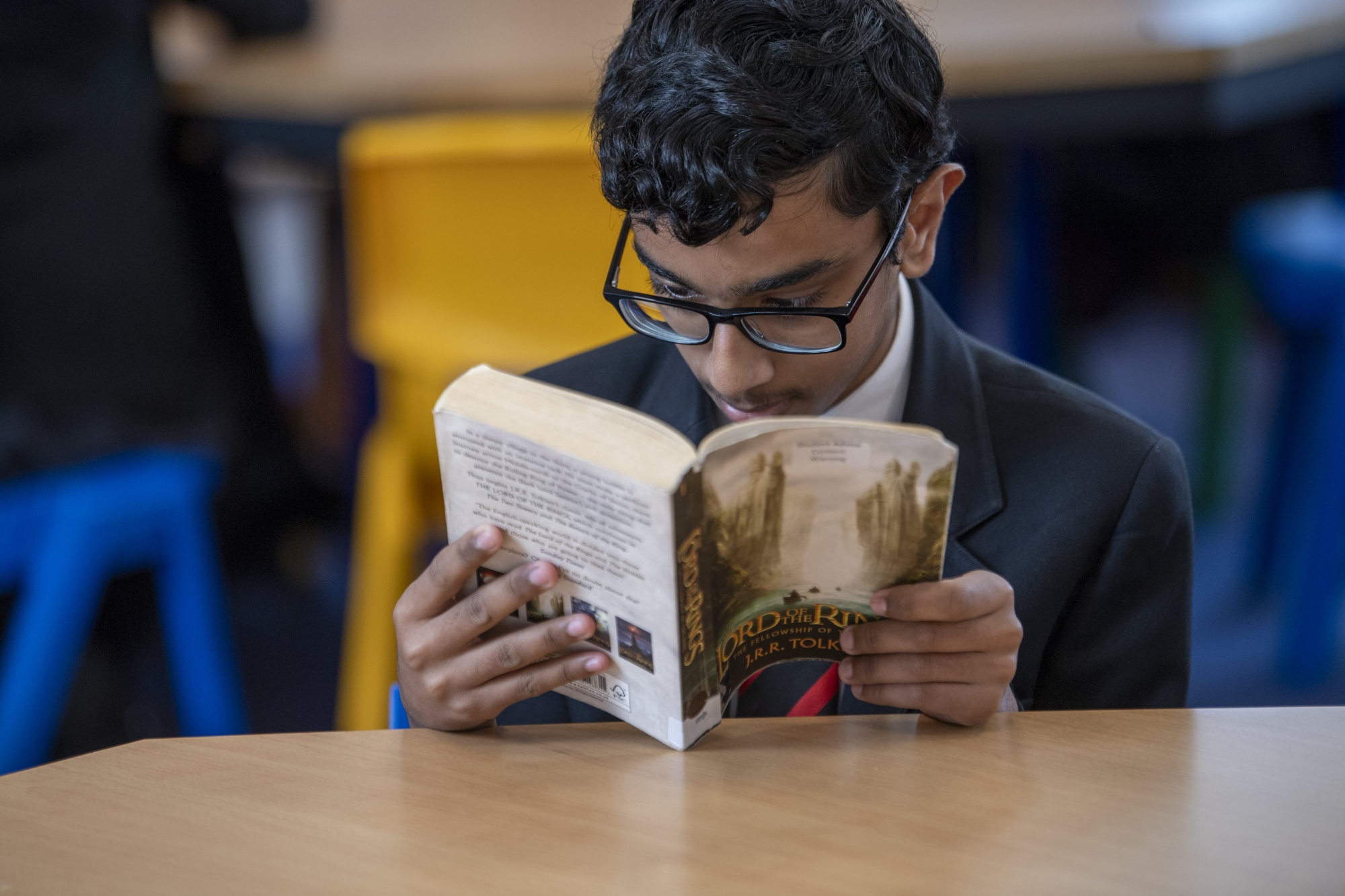English
Year 7
In Year 7, students begin their journey into Key Stage 3 and the fundamental process is the transition from Primary into Secondary education. In the term, students will develop their reciprocal reading skills and build on their Key Stage 2 knowledge. We begin with their baseline assessments, checking their reading, writing and spelling capabilities. After this, we begin to look at the origins of storytelling. We focus in on the topic of ‘Myths and Magic’, looking at Greek mythology and some seminal texts such as ‘Beowfulf’ and ‘Medusa’ and then building towards the ‘Myths and Magic’ which have been used in literature throughout the ages. We focus in on our local context looking at extracts from the work of Joseph Delaney and also reading about the Pendle Witches. The value of these texts has been highlighted within the National Curriculum for Key Stage 3 and the story-telling elements present the students with an understanding of the basic elements of a story and how these have underpinned narrative writing throughout the ages. This theme promotes an excellent breadth and depth of literary knowledge within our students and allows them to see the progression of story-telling throughout time. Students also begin to develop their analytical skills, considering the rationale behind writer’s choices and appreciating the reason behind specific linguistic and grammatical choices being made by writers. Students are also aided in developing their key vocabulary with a clear focus on Tier 2 and Tier 3 words. A love of Shakespeare is for some a love of the English language and that is what the unit in Term 2 seeks to promote. The students get to investigate the villains of Shakespearian literature whilst also looking at infamous extracts and inspirational quotations. The students begin to see behind the challenging text and look at the semantics of the Shakespearian lexicon and the beauty of its figurative language. The central text ‘King of Shadows’ is one which allows students to travel back in time to a land where Shakespeare roamed and begin to understand the sheer power and influence that Shakespeare has had on every aspect of our lives. In the Summer Term, students begin a thematic focus on ‘Justice’ based around the novel ‘GhostBoys’. This is a powerful text which incorporates essential elements of PSHE and citizenship. The central novel is surrounded by satellite texts which allow students to develop their knowledge within English with a focus on anaylsis, fiction and non-fiction writing and poetry. Students are also aided in developing their key vocabulary with a clear focus on Tier 2 and Tier 3 words. The theme of ‘Justice’ also forms the basis for the Spoken Language Presentations that our students deliver as part of their assessment for Term 3.
Year 8
Students will explore a range of Literature texts including a Shakespeare play, 19th Century Fiction, Contemporary Fiction and Poetry. They will also have the opportunity to develop their reading skills through weekly Accelerated Reader sessions. Students will develop their writing skills in terms of content and technical accuracy and learn to write for different audiences. Students will also have the opportunity to take part in discussion and drama focused tasks to develop their Speaking & Listening skills. In the Autumn term, students will build on prior knowledge from year 7 on myths and magic through developing their reading and writing skills in our ‘Superstition’ unit with is based around the central text of ‘The Hound of the Baskervilles’ by Sir Arthur Conan Doyle. Students will delve into the Gothic traditions of Dracula and Frankenstein and some eerie Gothic Poetry. They will be asked to write creatively and focus on the use of single words in order to create an impact. There will also be a significant exploration into a variety of different types of narrative. In Term 2, we build on Year 7’s knowledge of Shakespeare by focusing on his final play ‘The Tempest’ . ‘The Tempest’ explores Shakespeare’s fascination with the supernatural and allows us to consider some important contextual events of the time. In Term 3, the theme is ‘Battlegrounds’ within this students will read the novel ‘Welcome To Nowhere’ by Elizabeth Laird. This is the central text of a thematic approach which allows for a varied focus on different poems (conflict poetry), non-fiction texts and alternative literature all of which is based on ideas of war in its many forms and guises. The cross-curricular links to History are evident and there are also clear links to PSHE and citizenship through the focus on cultural differences and religious practices. ‘Battlegrounds’ is also the topic focus of the Spoken Language Presentation for our Year 8 students, and this is also completed in Term 3.
Year 9
In the Autumn Term students look at an enthralling and challenging scheme based around the ‘Jack the Ripper’ murders with a core text focus on ‘The Strange Case of Dr. Jekyll and Mr. Hyde’ by Robert Louis Stevenson. Students are asked to undertake the role of a detective to linguistically analyse texts surrounding the murder and other killers such as the Yorkshire Ripper (which has key local links). Students also delve into the Victorian era itself, a fantastic period for literature with clear literary figures such as Dickens and Blake espousing endless reams of literary genius which the students get to analyse and challenge. Students also get to develop their contextual knowledge of this time period and also look at the Edwardian context, a much shorter and less scrutinized time period but one which has great literary value. In the Spring Term, we rekindle our love for Shakespeare which has been honed and developed through Year 7 and Year 8. In the previous years, there has been an ‘Introduction to Shakespeare’ and a study of 'The Tempest'. However, this year we move on to a full and comprehensive Shakespeare study by reading ‘Romeo and Juliet’ under the theme of ‘Relationships’, this in-depth approach to the work of the Bard is essential for any English student and it is a must that students understand the impact that Shakespeare has had on our lives and his contextual influences. The satellite texts here add depth to our knowledge of Shakespeare but also look at the key issue of ‘relationships’ and enable students to have detailed and poignant discussions on these topics. In the Summer Term, we look at the central text of ‘Of Mice and Men’ which is underpinned by the topic of ‘Power’ and this will be the focus for this term. Surrounding this central text and a variety of satellite texts which include Poetry, Songs, Speeches, Letters and many more. Students have to use all of their literary skills and are challenged to consider emotive and potent ideas of race, age and gender discrimination. The subject of ‘Power’ also forms the basis for the Spoken Language Presentation for our Year 9 students and this is also completed in term 3.
Year 10
In KS4 (Years 10 and 11) the main focus for students is the detailed study of their Literature set texts in order to prepare adequately for the closed book exams. For Paper 1 students will study ‘Macbeth’ and ‘A Christmas Carol’ and for Paper 2 students will study ‘An Inspector Calls’ and the 15 ‘Power & Conflict’ poems as well as prepare for an unseen poetry assessment. Students also focus on being able to confidently use key Literature terminology to give them the tools for their analysis. In addition to preparation for their Literature exams, pupils will also be studying for English Language Paper 1 and Paper 2. Pupils will be given a range of fiction and non-fictional texts to study and develop their language analysis skills. At the end of Year 10, students will be assessed for the Spoken Language endorsement as part of their final GCSE English Language study. The skills we are focusing on in Year 10 are skills that pupils have already covered in KS3 but with more specific focus on exam technique.
The GCSE work is still clearly focused on the ‘Golden Threads’ that underpin every element that the English Department focus on – Narration, Description, Audience, SPaG, Analysis, Metaphor, Context, Poetry, Shakespeare and Immersion in Literature.
After each unit of work, pupils will be given an exam style question and they will be asked to answer it in exam conditions. This will allow them to put the exam techniques and skills they have studied into practice.
Rationale
The curriculum is structured and sequenced so that students can develop their knowledge and refine skills which are transferable throughout the English curriculum. For example, students start by exploring extracts which require close analysis of language, enabling them to develop:
inference skills (Golden Thread ‘Analysis’); knowledge of word classes; the etymology of words; subject terminology; word connotations; (Golden Thread ‘SPaG’) the impact of language choices (Golden Thread ‘Metaphor’); ‘zooming-in’ on language to unpick meaning (Golden Thread ‘Analysis’).
These skills subsequently feed into other areas of the English curriculum and enable students to approach later questions such as, the structure of a text, with more confidence. Students are also able to apply the same analysis skills to their study of literature. By starting with smaller, scaffolded extracts, students will develop and refine their approach and build confidence when analysing longer literary texts such as A Christmas Carol, Macbeth and An Inspector Calls (Golden Threads – Context, Immersion in Literature, Shakespeare, Analysis, Audience). Furthermore, the language-analysis and literacy skills which students develop and refine at the start of Year 10 are transferable to other areas of the school curriculum.
The study of texts such as A Christmas Carol also links effectively to the students’ study of Language Paper 2 which focuses on 19th century extracts. Literature and language are thus interleaved so that students can apply knowledge and transfer skills across language and literature.
Through the study of the writer’s craft and by exploring how writer’s present a viewpoint, students can apply their knowledge and skills for their own extended writing tasks in section B of both language papers. The curriculum is sequenced so that students can reflect on the methods they have used to analyse and write about language and then apply them to produce a piece of narrative / descriptive writing and an individual viewpoint task.
Year 11
In Year 11 the focus is on preparing for the English Language and Literature exams. For language, the skills needed for the reading section are synthesis, use of language, analysis of structure, comparison and evaluation. For the writing section students must be able to write for a variety of audiences on a given topic in both a creative task and a viewpoint piece. The skills they need to demonstrate here are content and organisation and technical accuracy. For Literature, there is one final text to study ‘An Inspector Calls’ which allows for a return to previous contextual knowledge and also to look at the issues of a patriarchal society. ‘An Inspector Calls’ challenges the status quo both in terms of content, context and delivery on stage. The focus on socialism and the ideals set by the Inspector builds a breadth of knowledge within our lessons, which helps their revision of the other key texts that we have studied in Year 10. In the terms of the other texts, the main focus is on demonstrating an understanding of main themes, ideas, character; use of quotation and reference to text to support interpretations in closed book conditions; analysis of language; personal interpretation and response (Golden Threads – all needed).
If you would like any more information about our English curriculum, please contact Mr L Boatwright, Head of English, by emailing lboatwright@colneprimet.co.uk, filling in the form on our contact us page or phoning the main office to arrange a call back.

